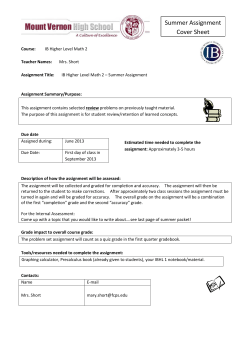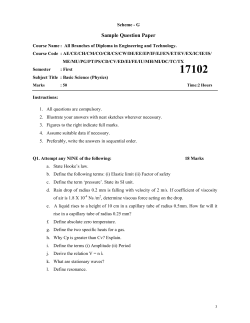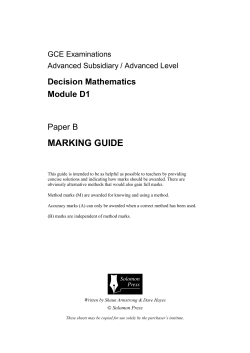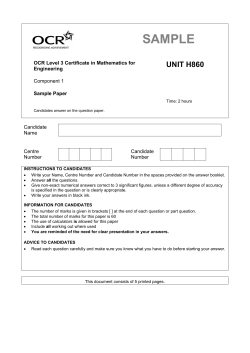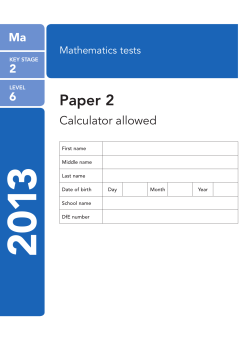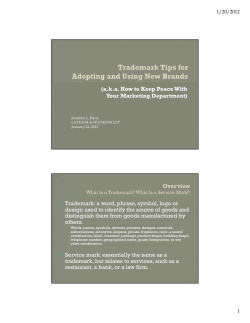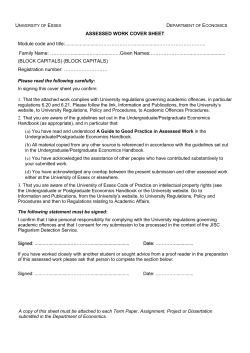
SPECIMEN F361 QP AS GCE CLASSICS
SPECIMEN F361 QP AS GCE CLASSICS Unit L1: Latin Language Specimen Paper Morning/Afternoon Time: 1 hour 30 minutes INSTRUCTIONS TO CANDIDATES • • • • • Write your name, centre number and candidate number in the spaces provided on the Answer Booklet. Please write clearly and in capital letters. Use black ink. Answer Section A and one question from Section B. Read each question carefully. Make sure you know what you have to do before starting your answer. Do not write in the bar codes. INFORMATION FOR CANDIDATES • • • The number of marks for each question is given in brackets [ ] at the end of each question or part question. The total number of marks for this paper is 100. This document consists of 8 pages. Any blank pages are indicated. SP (SLM) T12103 © OCR 2007 QAN 500/2616/X OCR is an exempt Charity [Turn Over 2 Answer Section A and one question from Section B. Section A 1 Translate the following passage into English. Please write your translation on alternate lines. The Roman Senate debates whether wives should accompany their husbands on official missions. During the debate Caecina proposed that no one appointed to be governor of a province should be allowed to take his wife with him. ‘quamquam uxor mea’ inquit ‘carissima mihi est – sex enim liberos habemus – per quadraginta annos eam semper in Italia reliqui. nam feminae in pace luxum,1 metum in bello ferunt. non solum laboribus mox defessae sunt sed etiam, si licentia2 adest, saevae, ambitiosae,3 potestatis avidae sunt; interdum4 inter milites ambulantes mandata5 centurionibus dant. feminae domos, fora et iam exercitus regunt.’ haec verba pauci senatores laudaverunt. Messalinus ita respondit: ‘quod Roma ab hostibus non iam obsidetur, aliquid libertatis mulieribus dare potuimus. nonne viris post laborem regressis decorum6 est se cum uxoribus oblectare?7 etiam si uxores saepe maritos suos corrumpunt,8 num melius est caelibes9 esse? meminerimus,10 si femina facinus admittat,11 culpam viri esse.’ Drusus, qui comes imperatoris erat, pauca addidit de matrimonio12 suo: affirmavit13 se miserrimum fore si in provincias iter sine uxore faciendum esset. sic sententia Caecinae elusa est.14 Adapted from Tacitus Annals III.33-34 Names Caecina, -ae m. Messalinus, -i m. Drusus, -i m. Caecina Messalinus (a senator) Drusus (a senator) Words luxus, -us m. 2 licentia, -ae f. 3 ambitiosus, -a, -um 4 interdum 5 mandatum, -i n. 6 decorus, -a, -um 7 oblecto, -are 8 corrumpo, -ere 9 caelebs, -ibis 10 memini, -isse 11 admitto, -ere 12 matrimonium, -i n. 13 affirmo, -are 14 eludo, -ere, elusi, elusus extravagance lack of control ambitious sometimes order right, fitting I amuse, delight I corrupt bachelor, unmarried I remember I commit marriage I declare I reject 1 [Section A Total: 70 marks] 3 Section B Answer either Question 2 or Question 3. 2 Translate the following passage into English. Please write your translation on alternate lines. Catilina, Cethegus and a number of other Roman noblemen conspired against the state during Cicero’s consulship. Sulla was accused of being a party to the conspiracy. Cicero is here defending Sulla. He argues that Catilina and Cethegus were lawless and anti-social by nature, and so their involvement in the conspiracy was no surprise. He implies here that Cethegus was responsible for the murder of Quintus Metellus Pius, a Roman general. In all important matters, gentlemen of the jury, each person’s wishes, thoughts and deeds must be judged by his character, not by the charges against him. For none of us can be changed suddenly in his nature. circumspicite1 hos ipsos homines qui huic adfines2 sceleri fuerunt. Catilina contra rem publicam coniuravit.3 quis eum contra patriam pugnantem periisse miratur4 quem semper omnes ad civile5 latrocinium6 natum7 putaverunt ? omitto ceteros, ne sit infinitum;8 tantum a vobis peto ut taciti de omnibus quos coniuravisse3 cognitum est cogitetis; intellegetis unum quemque eorum prius ab sua vita quam vestra suspicione9 esse damnatum.10 Cicero, Pro Sulla XXV (with omissions) 1 circumspicio, -ere adfinis, -e + dat. 3 coniuro, -are 4 miror, -ari, -atus sum 5 civilis, -e 6 latrocinium, -i n. 7 natus, -a, -um 8 infinitus, -a, -um 9 suspicio, -onis f. 10 damno, -are 2 I look around at, consider implicated (in) I conspire I am surprised civil fraud, robbery born endless suspicion I condemn [Section B Total: 30 marks] [Turn over 4 Do not answer this question if you have already answered Question 2. 3 Translate the following sentences into Latin. Please write on alternate lines. (a) The besieged general asked the senators to send help. [6] (b) The ships, which sailed the next day, were destroyed in a storm. [6] (c) Most men having died, the rest hurried to reach the general. [6] (d) If the men had not marched quickly, the Roman army would have been defeated. [6] (e) By fighting bravely, they hoped to have great glory. [6] 5 BLANK PAGE 6 BLANK PAGE 7 BLANK PAGE 8 BLANK PAGE Copyright Acknowledgements: Sources: Q1 Adapted from Tacitus Annals III.33-34 Q2 CICERO, Pro Sulla XXV (with omissions) Permission to reproduce items where third-party owned material protected by copyright is included has been sought and cleared where possible. Every reasonable effort has been made by the publisher (OCR) to trace copyright holders, but if any items requiring clearance have unwittingly been included, the publisher will be pleased to make amends at the earliest opportunity. OCR is part of the Cambridge Assessment Group. Cambridge Assessment is the brand name of University of Cambridge Local Examinations Syndicate (UCLES), which is itself a department of the University of Cambridge © OCR 2007 OXFORD CAMBRIDGE AND RSA EXAMINATIONS AS GCE CLASSICS F361 MS Unit L1: Latin Language Specimen Mark Scheme The maximum mark for this paper is 100. This document consists of 5 printed pages and 1 blank page. SP (SLM) T12103 © OCR 2007 QAN 500/2616/X OCR is an exempt Charity 2 Section A Question Number 1 Answer Marks Translate the following passage into English. Please write your translation on alternate lines. The Roman Senate debates whether wives should accompany their husbands on official missions. During the debate Caecina proposed that no one appointed to be governor of a province should be allowed to take his wife with him. 1 2 ‘quamquam uxor mea’ inquit ‘carissima mihi est – sex enim liberos habemus – per quadraginta annos eam semper in Italia reliqui. 3 nam feminae in pace luxum, metum in bello ferunt. 4 non solum laboribus mox defessae sunt sed etiam, si licentia adest, saevae, ambitiosae, potestatis avidae sunt; interdum inter milites ambulantes mandata centurionibus dant. 5 6 feminae domos, fora et iam exercitus regunt.’ haec verba pauci senatores laudaverunt. 7 Messalinus ita respondit: ‘quod Roma ab hostibus non iam obsidetur, aliquid libertatis mulieribus dare potuimus. 8 9 nonne viris post laborem regressis decorum est se cum uxoribus oblectare? 10 etiam si uxores saepe maritos suos corrumpunt, num melius est caelibes esse? 11 meminerimus, si femina facinus admittat, culpam viri esse.’ 12 Drusus, qui comes imperatoris erat, pauca addidit de matrimonio suo: 13 affirmavit se miserrimum fore si in provincias iter sine uxore faciendum esset. 14 sic sententia Caecinae elusa est. The passage has been divided into 14 sections each worth 5 marks. Award up to 5 marks per translated section according to the 5-mark marking grid. [5] [3] [2] Correct translation (as agreed at standardisation), with one minor error allowed One serious error or two minor errors, otherwise the meaning is conveyed Most of the meaning conveyed, but several errors Half the meaning conveyed; the rest seriously flawed [1] A minority of meaning conveyed [0] No elements of meaning conveyed; no relation to Latin at all [4] [70] N.B. Consequential errors should not be penalised. Section A Total [70] 3 Section B Question Number 2 Answer Marks Translate the following passage into English. Please write your translation on alternate lines. Catilina, Cethegus and a number of other Roman noblemen conspired against the state during Cicero’s consulship. Sulla was accused of being a party to the conspiracy. Cicero is here defending Sulla. He argues that Catilina and Cethegus were lawless and antisocial by nature, and so their involvement in the conspiracy was no surprise. He implies here that Cethegus was responsible for the murder of Quintus Metellus Pius, a Roman general. In all important matters, gentlemen of the jury, each person’s wishes, thoughts and deeds must be judged by his character, not by the charges against him. For none of us can be changed suddenly in his nature. 1 2 circumspicite hos ipsos homines qui huic adfines sceleri fuerunt. Catilina contra rem publicam coniuravit. quis eum contra patriam pugnantem periisse miratur 3 quem semper omnes ad civile latrocinium natum putaverunt? 4 5 omitto ceteros, ne sit infinitum; tantum a vobis peto ut taciti de omnibus quos coniuravisse cognitum est cogitetis; 6 intellegetis unum quemque eorum prius ab sua vita quam vestra suspicione esse damnatum. The passage has been divided into 6 sections each worth 5 marks. Award up to 5 marks per translated section according to the 5-mark marking grid. [5] [3] Correct translation (as agreed at standardisation), with one minor error allowed One serious error or two minor errors, otherwise the meaning is conveyed Most of the meaning conveyed, but several errors [2] Half the meaning conveyed; the rest seriously flawed [1] A minority of meaning conveyed [0] No elements of meaning conveyed; no relation to Latin at all [4] N.B. Consequential errors should not be penalised. [30] 4 Section B Question Number 3 Answer Marks Translate the following sentences into Latin. Please write on alternate lines. There are many acceptable ways of translating the English sentences into correct Latin. One example for each sentence is given below. Acceptable alternatives will be agreed at Standardisation, but examiners should be ready to accept other versions that accurately render the meaning into Latin. 3(a) The besieged general asked the senators to send help. [6] imperator obsessus senatores rogavit ut auxilium mitterent. 3(b) The ships, which sailed the next day, were destroyed in a storm. [6] naves, quae postridie navigabant, in tempestate deletae sunt. 3(c) Most men having died, the rest hurried to reach the general. plurimis hominibus mortuis, reliqui contenderunt ut ad imperatorem pervenirent. 3(d) If the men had not marched quickly, the Roman army would have been defeated. nisi homines celeriter contendissent, exercitus Romanus victus esset. 3(e) [6] [6] By fighting bravely, they hoped to have great glory. fortiter pugnando, sperabant se magnam famam habituros esse. [6] Each sentence is worth 6 marks. Award up to 6 marks for each sentence according to the 6-mark marking grid. [6] [5] [4] [3] [2] [1] [0] Correct translation (as agreed at standardisation), with one minor error allowed Minor errors only in syntax or accidence Rather more errors, but a good proportion of sentence correct Around half the accidence and syntax correct Accidence and syntax seriously flawed A very little correct Latin No correct Latin at all Section B Total [30] Paper Total [100] 5 Assessment Objectives Grid (no QWC) Question AO1 AO2 Total 1 35 35 70 2 15 15 30 3(a) 3 3 6 3(b) 3 3 6 3(c) 3 3 6 3(d) 3 3 6 3(e) 3 3 6 Totals 50 50 100 6 BLANK PAGE
© Copyright 2025


